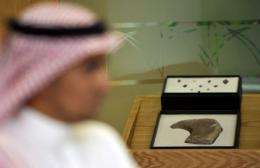Archaeological artifacts are displayed during a news conference in the Saudi Red Sea city of Jeddah on August 24. Saudi Arabia has found traces of a civilisation that was domesticating horses about 9,000 years ago, 4,000 years earlier than previously thought, the kingdom said.
Saudi Arabia has found traces of a civilisation that was domesticating horses about 9,000 years ago, 4,000 years earlier than previously thought, the kingdom said.
"This discovery shows that horses were domesticated in the Arabian Peninsula for the first time more than 9,000 years ago, whereas previous studies estimated the domestication of horses in Central Asia dating back 5,000 years, Ali al-Ghabban, vice-chairman of the Department of Museums and Antiquities, said at a news conference late Wednesday.
The remains of the civilisation were found close to Abha, in southwestern Asir province, an area known to antiquity as Arabia Felix.
The civilisation, given the name al-Maqari, used "methods of embalming that are totally different to known processes," Ghabban said.
Among the remains found at the site are statues of animals such as goats, dogs, hawks, and a metre-tall bust of a horse, Ghabban said.
"A statue of an animal of this dimension, dating back to that time, has never been found anywhere in the world," Ghabban said.
He added that archaeologists also found arrowheads, stone tools, weaving tools and mortars for pounding grain, reflecting the development of that civilisation.
The remains were found in a valley that was once a riverbed, at a time when the now-arid Arabian Peninsula was more humid and fertile, the official said.
An international team of archaeologists published an article in January that suggested human beings could have been present on the Arabian Peninsula about 125,000 years ago.
(c) 2011 AFP






















